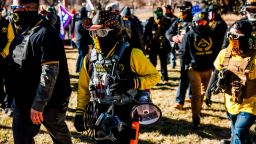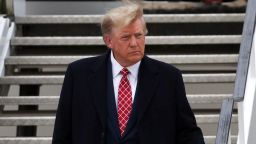Editor’s Note: Jacob Glick is policy counsel at Georgetown University Law Center’s?Institute for Constitutional Advocacy and Protection. He previously served as investigative counsel on the House Select Committee to Investigate the January 6 Attack on the US Capitol. Jon Lewis is a research fellow at the?Program on Extremism at George Washington University, where he studies domestic violent extremism. The views expressed in this commentary are their own. Read more opinion articles on CNN.?
Thursday’s?conviction?of four Proud Boys leaders for their seditious conspiracy to overthrow the United States government on January 6, 2021 is a landmark victory for democracy and the rule of law.
Throughout the four-month federal trial in the District of Columbia, defendants repeatedly tried to?cast doubt?on the seriousness of the Proud Boys as an organization, encouraging the jurors to question whether it was capable of plotting an assault on the Capitol.
With this conviction, those doubts should be put to rest. As evidence from both the?Department of Justice?and the?House Select Committee?showed, the Proud Boys mobilized with military-style discipline and tactics in advance of their attack on the Capitol. Their leaders used encrypted chats to plot out their strategy, as well as to?communicate?with prominent allies of then-President Donald Trump, like?Roger Stone.
Despite attempts by the Proud Boys to dismiss themselves as a “fraternity” or a “drinking club,” this verdict should expose all Americans to the truth: that the Proud Boys are an?extremist,?neo-fascist?paramilitary?group that seeks to use?vigilante?violence against their enemies.
But most importantly, Americans must understand that the threat posed by the Proud Boys is far from over. While these convictions are a crucial first step in holding the Proud Boys accountable for their actions on January 6 and diminishing their ability to attract a widespread following, the anti-democratic violence that they unleashed at the Capitol is still a potent threat.
On January 6, 2021, a?broad coalition of extremists?came together to violently oppose the peaceful transfer of power. Now, the Proud Boys and other remnants of the January 6 coalition are geographically dispersed but ideologically united as they seek to inject violence and fear into the?culture wars?now being fought in towns and cities across the United States.
Since serving as the?tip of the spear?on January 6, the Proud Boys have largely retreated from the?limelight?they enjoyed in the lead-up to the attack. As federal pressure forced the group to eschew national-level organizing, individual chapters have adjusted their strategy to pursue a more localized campaign of violence and intimidation against new targets,?including?the?LGBTQ+ community.
This?reinvigorated?offensive has largely been?focused?on drag performances, as Proud Boys?spread?dangerous conspiracies about LGBTQ+ individuals sexually “grooming” minors and use those conspiracies as an excuse to self-deploy to drag shows, often heavily armed.
The tactical?evolution?of the Proud Boys since January 6 largely mirrors a broader shift in the domestic violent extremist landscape in this period. Just as a coalition of far-right extremists weaponized President Trump’s stolen election narrative as they?mobilized?ahead of the Capitol attack, these same groups and movements continue to exploit popular narratives that help to radicalize an increasingly broad group of Americans.
These?narratives have focused?on supposed threats to American families and culture, with the Proud Boys and others warning that their political opponents are seeking to destroy the country as we know it. In this apocalyptic view, anyone standing in opposition to the Proud Boys are legitimate targets for hateful rhetoric, harassment, dehumanization and violence – like the Capitol Police who stood in their way on January 6.
After a few months spent?disrupting?school board meetings that were trying to implement Covid-19 vaccine guidelines or racially inclusive?curricula, the Proud Boys seized on rising currents of homophobia and transphobia to remake their agenda and electrify their supporters.
Get Our Free Weekly Newsletter
- Sign up for CNN Opinion’s newsletter
- Join us on Twitter and Facebook
Since 2022, the Proud Boys have organized over 150 armed demonstrations at drag events, according to a?report?by the Gay & Lesbian Alliance Against Defamation. Some events have been?canceled?because of a fear of violence, while others have devolved into?violent?clashes?between Proud Boys and supporters of the LGBTQ+ community.?As attacks on the LGBTQ+ community continue to?dominate?American politics, the Proud Boys have once more positioned themselves as leading a crusade against evil. We know where that leads.
Make no mistake: these seditious conspiracy convictions are a body blow to the Proud Boys’?embattled?national organization. But the mobilization of local Proud Boys chapters against the LGBTQ+ community shows that their threat remains, whatever the future holds for the Proud Boys as a nationwide entity.
Therefore, the guilty?verdicts?should be an opportunity for our country to remind itself of the threat that is posed by anti-democratic extremists who are still menacing our families and communities.
We must educate ourselves about?laws in all 50 states?that prohibit activities by private paramilitary groups like the Proud Boys. We must reject the?persistent attempts to whitewash?the Proud Boys and their allies as they try to force themselves back into the mainstream. Finally, we must stand up to political violence by remaining engaged in civic life and redoubling our commitment to democracy.
In the end, that’s the verdict that the Proud Boys fear most.


